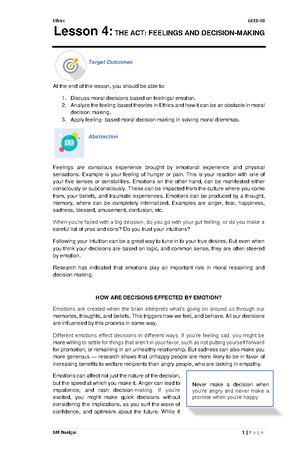- Information
- AI Chat
Was this document helpful?
Introduction TO THE KEY Concepts
Course: Ethics (GE9)
102 Documents
Students shared 102 documents in this course
University: Pangasinan State University
Was this document helpful?

INTRODUCTION TO THE KEY CONCEPTS
MODULE OVERVIEW
Module Outline:
A. The Need to Study Ethics and the Importance of Rules to Social Beings
B. Moral versus Non-moral Standards
C. What are Dilemmas?
D. What are the Three Levels of Moral Dilemmas?
E. Foundation of Morality
Introduction
What is morality? Morality is “a system of beliefs about what is right behavior and wrong behavior”
(Rubin, 2015). Morality refers to “the principles of right and wrong behavior or rightness and wrongness
(that is, goodness and badness) of human actions” (philonotes.com, 2018).
In his book, Elements of Moral Philosophy, author and university professor Dr. James Rachels – a
philosopher who specialized in Ethics – asserted that “at the very least morality is the effort to guide
one’s conduct by reason, to act based on the best reasons for doing, while giving equal weight to the
interests of each individual affected by one’s decision” (Gallinero, 2018).
In this Module, you will learn how to distinguish a moral standard from non-moral standards and
likewise distinguish a moral dilemma from any other types of dilemmas. You will also learn in this
Module how to identify and classify moral experiences as they happen in different levels of human
existence.
MODULE LEARNING OBJECTIVES








